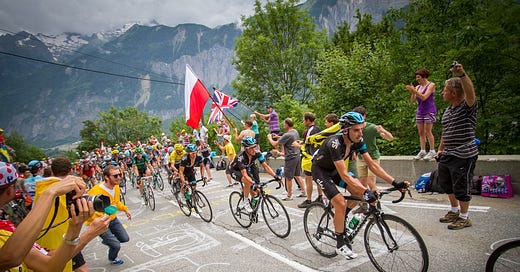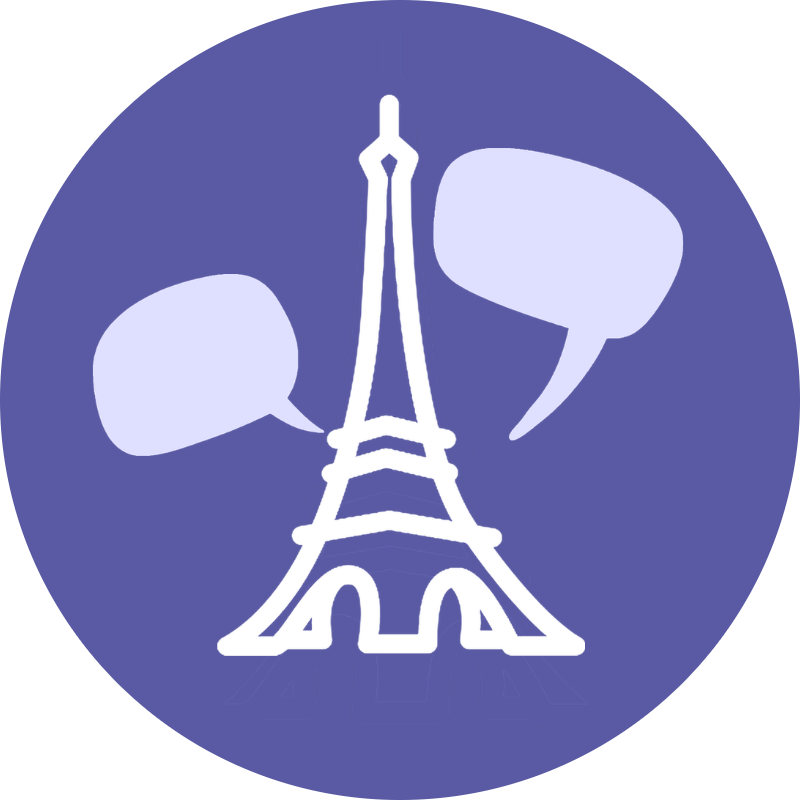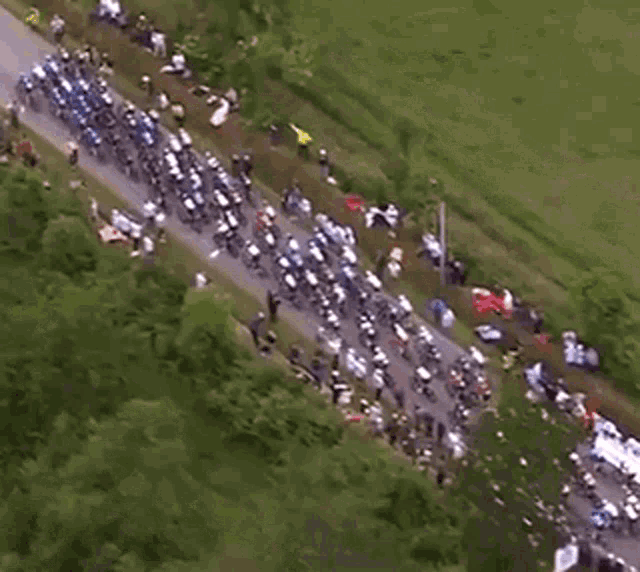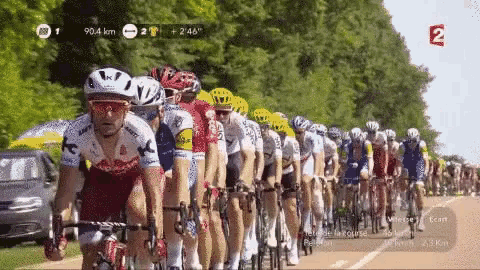Coucou ☕️🇫🇷🥐 I'm Amélie Laurent and this is my French newsletter. I supercharge your progress from A2 to B2 through colloquial dialogues.
If you've received this, then you either subscribed or someone forwarded it to you.
If someone forwarded it and you want to subscribe, then you can click on this handy little button:
Hey mes chers abonnés 🙌🏼😎
I had today’s dialogue drafted several weeks ago, but it got lost on the editing-room floor and the Tour de France is now over. 🙈 But it only happens once a year, and I don’t want to wait a whole year to post this baby!
That’s when I remembered.. I can post whatever I like! There’s no newsletter-police coming to arrest me for slightly-mistimed posts.. what a relief! 😂
So please forgive the delay on this one. There isn’t as much hype because the race has ended, but it’s important for any learner of French to have some knowledge of this iconic French bike race. And (as always) the phrases, verbs and vocab are helpful even if you couldn’t give a fig about the topic.
Chaque année, au mois de juillet, des millions de Français se réunissent au bord des routes pour voir passer les coureurs de la Grande Boucle.
En plus d’un siècle d’existence, le Tour de France s’est imposé comme un des évènements sportifs les plus suivi du monde.
Mais d’où vient cette popularité et comment est-il devenu une course aussi légendaire ? C’est ce que nous allons essayer de comprendre dans cet épisode.
🎧 Here’s Hugo from Inner French’s episode on the Tour.
📺 And here’s the great official Le Tour de France for newbies video.
Where’s the question Amélie.. where is it?!
You might also notice that this dialogue doesn’t start with a “conversation-starter” question! 🫢 “But every French with Amélie dialogue starts with a conversation-starter question!” I hear you cry out in unison.
And you would be right! Every French with Amélie dialogue.. until today.
This is a bit of a one-off with the Tour de France. But I’m considering having a new series—maybe French 101 🇫🇷 (?)—that begins to cover some fun French topics (Planning a trip, the weather, a doctor’s visit etc.) but with French with Amélie’s unique format and style. Could be fun. What do you guys think? 👀
Courage, mes chers élèves! Keep going. 🎉
We all secretly know the only way to truly learn a language are real-life conversations and experiences. Lessons and grammar can only take us so far.
While real-life experiences are difficult to recreate, my colloquial conversational dialogues help you learn authentic French in context. They’re how real French people actually speak.
If you have any questions or concerns - comment below or simply reply to this email.
Gros Bisous! A x
Dialogue Audio 🎧
Dialogue du Jour
Léo : Regarde, les coureurs du Tour de France arrivent. Le peloton ne veut pas les laisser partir. Tu vois le maillot jaune ✪ là-bas➹ ?
Emma : Oui, je le vois ! Je peux les repérer ✪ facilement dans la foule avec ces couleurs vives. Oh, attends, qu'est-ce qui se passe ?
Léo : C'est quoi ce boucan ✪? Que se passe-t-il ? ✪
…
Oh non ! Un des cyclistes vient d'entrer en collision avec un spectateur.
Emma : Il est renversé ✪! Je ne peux pas le croire ! Le pauvre gars ! Tu penses qu'il est en panne ✪?
Léo : Je suis pas sûr, il a l'air de bouger un peu. J'espère qu'il n'est pas gravement blessé. Méfie-toi ✪, un accident peut survenir à tout moment pendant ces événements.
Emma : Il faudrait vraiment faire attention. Mais qui pourrait être mis en cause ✪? Le cycliste ou le spectateur ?
Léo : C'est difficile à dire. Peut-être que les organisateurs devraient revoir les mesures de sécurité.
Emma : Oui, t’as raison. J'espère qu'ils vont bien. On peut se rapprocher ?
♡ 𝕃𝕚𝕜𝕖 𝕓𝕖𝕝𝕠𝕨 👇
✪ Notes
les coureurs = runners, yes, but also racers/cyclists le peloton, we use the same word in English, it’s the main group of cyclists during the race, a big swarm. le maillot jaune = the yellow jersey, the jacket the current winning rider gets to wear. The basic Tour de France vocab.
repérer ✨ = remarquer, trouver = find/locate/detect “Je peux repérer du photoshop à des kilomètres” (I can spot a photoshop from a mile away)
boucan = a racket / din. The less colloquial word for this is ‘vacarme’ which also might be new. “Je ne peux pas me faire entendre par-dessus le vacarme” (I can't make myself heard over the din). Nothing makes you sound more native, and especially more French than complaining…. and loud noise is always a great (and completely justified!) reason to complain!
qu'est-ce qui se passe ? que se passe-t-il ? ✨ = what's going on? what's happening? (right now, a situation is unfolding, not ‘how are you?’) Just a great thing to be able to ask with ease. Always a helpful question to get an answer to in life.
renversé = spilled / the wrong way round. “C'est juste de l'eau renversée. N'en fais pas un drame” (It's just spilt water. Don't make a big deal of it)
en panne✨ = qui ne fonctionne plus = the catch all French term for ‘broken’ (out of order/not working). Come to think of it.. this is another great thing to complain about! “La chaudière est en panne alors j'ai appelé le réparateur.” (The boiler has broken down, so I called the repairman)
méfie-toi✨ = Watch out! Be careful! Some day you’ll want to shout this at someone - learn it now so you know what to shout.
mis en cause = (call into) question / challenged “Personne n'a jamais mis en cause tes capacités” (No one has ever questioned your abilities)
*✨ = especially ‘Frenchie’ words/phrases you should try and use more
Writing Prompt ✍️
A few years ago, while walking in the city, a car suddenly swerved to avoid colliding with another vehicle, but it ended up hitting a lamppost instead. The sound of the impact was startling, and I remember how strong the feeling of shock was, I was frozen solid. It didn't seem like anyone was seriously injured, but that’s one of the oddest things about witnessing accidents.. you never do know how things end up, were all the people ok?
Alors, as-tu déjà été témoin d'un accident ?
All answers are welcome. One word.. or one sentence.
Write me your answer in the comments. I can’t wait to read them! 👇🏼
Translation
L: Look, the Tour de France riders are coming. The peloton won't let them get away. Can you see the yellow jersey over there?
E: Yes, I can see it! I can spot them easily in the crowd with those bright colours. Oh, wait, what's going on?
L: What's all the racket? What's going on there?
...
Oh no! One of the cyclists has just collided with a spectator.
E: He's been run over! I can't believe it! The poor guy! Do you think he's broken down (down and out)?
L: I'm not sure, he seems to be moving a bit. I hope he's not seriously hurt. Be careful, accidents can happen at any time during these events.
E : We really should be careful. But who could be at fault? The cyclist or the spectator?
L: It's hard to say. Maybe the organisers should review the safety measures.
E: Yes, you're right. I hope they're OK. Can we get closer?
Exercise - Fill in the blank 💪
Quickly test your comprehension, accelerate your learning. 🚀
Il y a tellement de __ dans la rue à cause de la parade.
There's so much noise in the street because of the parade.Lorsque la lumière s'est éteinte, tout le monde a crié : "__?"
When the light went out, everyone shouted, "What's going on?"Il est difficile de __ un chat noir la nuit.
It's hard to spot a black cat at night.Après plusieurs tentatives, nous avons réalisé que la voiture était __.
After several attempts, we realised the car was broken down.__ des apparences; ce gâteau pourrait ne pas être aussi doux qu'il y paraît.
Beware of appearances; this cake might not be as sweet as it looks.
If you’re struggling the ✪ Notes section is always a good place to look. 😉 The answers are all in the dialogue or notes section.
[NO PEAKING] Answer Key: 1. boucan 2. qu'est-ce qui se passe ? 3. repérer 4. en panne 5. méfie-toi
Une Façon d'utiliser ce Dialogue
These dialogues are a very simple tool. Yet this allows them to be versatile and endlessly flexible to you and your learning style.
Here’s one way you could use the dialogue this week:
👄 Beginner ‘Shadowing’ - Listen to the recording and read the dialogue aloud at the same time.
Repeat this at least x3. You will be surprised at how you can self-detect mistakes. It’s the best way not only to master colloquial speech, but accent and intonation as well.
Check out my quick guide🔗 for different ways you can learn with these dialogues. Perfect if you’re finding them too easy or too hard. 🙌🏻
Private French Lessons
If you’re a serious intermediate student, and would like a private lesson, you can book one here →. Please note there are limited spots available, it is '“first-come first-served” as you say in English.
𝔻𝕠𝕟'𝕥 𝕗𝕠𝕣𝕘𝕖𝕥 𝕥𝕠 ♡ 𝕝𝕚𝕜𝕖 𝕠𝕟 𝕊𝕦𝕓𝕤𝕥𝕒𝕔𝕜👇
If you want a link to message someone or share on socials (this is the biggest thing you can do to help me grow! 🌱) here it is:
If you have any type of feedback please let me know in the comments. Or you can just reply to this email.
Signing off for now. Remember, keep going! Salut! 🐌
Amélie x














“Attention”!! - that’s what I said I would say if I ever forgot “méfie-toi”😂
Oh, how I love to read these newsletters! I look forward to them since I subscribed recently. I downloaded this app just so I could begin to leave comments
Merci beaucoup Amélie!
Ces newsletters sont formidables 👍 Merci beaucoup Amélie . Aussi, j'adore le Tour et les vélos 🚴♀️ mais mon réponse a disparu 🤷♂️